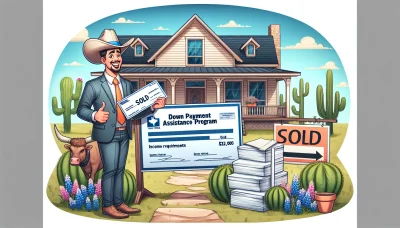Home market Quiz
Test Your Knowledge
Question of
Understanding the Home Market
Current Real Estate Trends
The real estate market is a dynamic landscape, constantly influenced by various factors such as economic shifts, demographic changes, and even technological advancements. Currently, we're seeing a trend towards urban rejuvenation and the popularity of smart homes, which cater to the modern homeowner's desire for convenience and connectivity. This shift is reshaping real estate investment strategies and consumer preferences at a rapid pace.
Another prevailing trend is the rise of sustainable living, driving demand for eco-friendly homes that minimize environmental impact. This green movement is not just a fad; it's becoming an integral part of the property market as more buyers seek energy-efficient features that promise long-term savings and benefits.
Analyzing Housing Market Data
To truly grasp the pulse of the housing market, one must dive into the data. Sales volumes, median prices, and inventory levels are just the tip of the iceberg. By dissecting this information, trends begin to surface, revealing insights into consumer behavior and market health. For instance, a low supply coupled with high demand typically signifies a seller's market, leading to price increases.
One crucial piece of data is the average time on market for listings. A decrease in this number often indicates a heating market where homes are selling faster, while an increase can signal a cooling phase or buyer's market.
Predicting Future Market Movements
Predicting where the housing market is headed involves understanding past patterns and current conditions. Experts often look at interest rate trends, employment statistics, and even political climate to forecast future movements. While no prediction is foolproof, informed speculation can be incredibly valuable for investors and homebuyers alike.
Technological advancements like big data analytics and artificial intelligence are revolutionizing how we predict market trends. These tools can analyze vast amounts of data to identify potential shifts with greater accuracy than traditional methods.
Factors Influencing Home Values
A multitude of factors come into play when determining home values. From the age and condition of the property to local amenities and crime rates, each aspect holds weight in the valuation process. Understanding these factors can help homeowners and investors make savvy decisions regarding buying, selling, or renovating properties.
The local job market also has a profound impact on home values. Areas with growing employment opportunities tend to attract more residents looking for housing, thereby increasing demand and driving up prices.
The Impact of Location on Prices
Location is king in real estate! Proximity to top-rated schools, employment centers, public transportation, and entertainment districts can significantly elevate property values. Conversely, homes in areas with less desirable attributes tend to have lower price tags due to reduced demand.
Natural features such as waterfronts or mountain views also play a pivotal role in property valuation. Properties with unique or scenic vistas command premium prices in the marketplace.
The Role of Economic Indicators
- Gross Domestic Product (GDP): A robust GDP indicates a healthy economy which generally leads to stronger demand for housing.
- Employment Rates: Higher employment equates to more people with stable incomes looking to buy homes.
- Interest Rates: Low-interest rates make borrowing cheaper; thus, more people can afford mortgages which increases home-buying activity.
- Inflation: With inflation, property values tend to rise as replacement costs go up along with rents.
- Rental Yields: High rental yields can attract investors who push up demand and prices in certain markets.
- Consumer Confidence: When consumers are optimistic about their financial futures they are more likely to purchase homes.
- Housing Starts: An indicator of new construction activity that signals developers' confidence in the market.
Preparing to Buy a Home
Financial Planning for Homebuyers
Embarking on the homebuying journey starts with a solid financial foundation. It's crucial to review your finances, considering income, debts, and credit score. A good credit score can unlock better mortgage rates, while low debt-to-income ratios make you an attractive borrower.
Saving for a Down Payment is a pivotal step in purchasing your dream home. Aim to save at least 20% of the home's value to avoid private mortgage insurance (PMI). Automated savings plans and budget adjustments can accelerate your down payment fund growth.
Understanding Mortgage Options involves getting familiar with terms like fixed-rate, adjustable-rate, and interest-only mortgages. Consult with mortgage advisors to determine the best plan for your situation. Remember, securing pre-approval can give you a competitive edge when making offers.
Finding the Right Property
Conducting a Home Search today is more dynamic than ever. Utilize online platforms, work with real estate agents, and don't overlook open houses. Keep a list of must-haves and deal-breakers to streamline your search.
Evaluating Neighborhoods and Schools is essential for future satisfaction. Research crime rates, local amenities, and commute times. If schools are important to you, consider school district ratings and proximity to potential homes.
- Set a Budget: Determine how much you can afford before looking at properties.
- Get Pre-approved: This shows sellers that you are serious and capable of purchasing their home.
- Research Market Trends: Understanding the market will help you make informed decisions.
- Hire a Reputable Agent: A good agent can make all the difference in finding the right property.
- Inspect Thoroughly: Always get a professional home inspection to avoid costly surprises later on.
- Negotiate Terms: Be ready to negotiate on price and terms of sale; it's part of the process.
- Avoid Emotional Decisions: Stay rational about what you need versus what you want in a home.
- Consider Resale Value: Think about how easy it will be to sell the home in the future should your circumstances change.
Selling Your Property Effectively
Setting the Right Price
Establishing the optimal selling price is a pivotal step in the property selling process. It's a delicate balance; set it too high and you risk alienating potential buyers, too low and you leave money on the table. A strategic approach based on market data will guide you towards a price that attracts interest and offers.
Comparative Market Analysis is your secret weapon. This analysis involves scrutinizing properties similar to yours that have recently sold in your area. By comparing these properties, often referred to as "comps," you can gauge what buyers might be willing to pay for your home.
However, pricing isn't set in stoneAdjusting to Market Conditions is crucial. If your home is on the market and not attracting interest, it may be time to reconsider your price. Keep an eye on how quickly homes are selling and listen to feedback from viewings.
Marketing Your Home
The way you present your property can make a world of difference. Creating an inviting atmosphere where potential buyers can visualize themselves living is key. This begins with decluttering and possibly even depersonalizing your space to make it as appealing as possible to a broad audience.
Staging Tips for Sellers:
- Maintain a clean and neutral environment to allow buyers to imagine their own lives in the space.
- Rearrange furniture to maximize space and flow within each room.
- Add small touches such as fresh flowers or baked goods during viewings for a welcoming feel.
- Invest in minor repairs and touch-ups, ensuring everything appears well-maintained.
- Consider hiring a professional stager if your budget allows, as they bring expertise in optimizing your home's appeal.
Capturing the beauty of your home through photography is another essential aspect of marketing. High-quality visuals are often the first impression potential buyers have of your property, making them indispensable tools for online listings. Hire a professional real estate photographer who knows how to use lighting and composition to showcase your home at its best.
In this digital age, having an online presence for your property is non-negotiable. Utilize various platforms like social media, real estate websites, and virtual tours to reach a wider audience. Detailed descriptions alongside captivating images can spark interest and drive traffic to viewings.
Investing in Real Estate
Types of Real Estate Investments
Diving into real estate opens up a plethora of avenues for the savvy investor. It's a realm characterized by tangible assets, potential for steady cash flow, and opportunities for long-term appreciation. Whether you're looking to dip your toes or dive in headfirst, understanding the diverse landscape is key to aligning your investment with your financial goals.
Residential properties often serve as an entry point for many investors due to their familiarity. They can range from single-family homes to multi-unit apartments. On the flip side, commercial real estate encompasses office spaces, retail locations, and warehouses, offering longer lease terms and potentially higher income but with a larger initial investment and operational complexity.
Residential vs. Commercial Properties
Residential investments are typically perceived as less intimidating, with more manageable costs and a vast market of potential renters. They're ideal for those seeking to develop a passive income stream or take advantage of tax breaks associated with property ownership. However, they can also come with their own set of challenges such as tenant turnover and property management demands.
Commercial real estate is where things get really interesting for those with a bit more capital and risk tolerance. These properties often yield higher returns and longer lease contracts which translate into less frequent tenant turnover. However, they require a deeper understanding of industry trends and may be more sensitive to economic fluctuations.
Real Estate Investment Trusts (REITs)
For those eager to invest in real estate without owning physical property, REITs are a fantastic option! These trusts own or finance income-producing real estate across various sectors. By investing in a REIT, you get to enjoy the spoils of real estate investments think dividends without the hassle of being a landlord.
REITs are incredibly accessible as they trade on major stock exchanges. They offer liquidity that direct property investments can't match, making them an attractive choice for diversification in investors' portfolios. Moreover, they typically provide high dividend yields alongside the potential for capital appreciation.
Maximizing Return on Investment
To truly excel in real estate investing, one must adopt strategies that enhance property value and maximize returns. This isn't just about buying property; it's about applying shrewd enhancements that boost its worth and desirability. It requires astute market analysis, creative thinking, and sometimes just plain hard work.
Rental yields are the bread and butter of real estate profitability; understanding them is crucial. They represent the income generated from rental properties as a percentage of its value. To thrive, investors need to manage properties effectively to keep occupancy high while strategically setting rents to optimize income without deterring quality tenants.
Renovation and Value-Adding Strategies
- Analyze Market Demands: Before renovating, understand what features add the most value in your specific market.
- Focused Improvements: Invest in areas that offer the highest return on investment like kitchens and bathrooms.
- Curb Appeal Matters: Never underestimate the power of first impressions. A well-maintained exterior can significantly impact property value.
- Eco-Friendly Upgrades: Energy-efficient improvements can lead to long-term savings for both owners and tenants.
- Maintenance is Key: Regular maintenance prevents costly repairs down the line and keeps properties at peak desirability.
- Avoid Overcustomization: Keep renovations neutral to appeal to the widest range of potential renters or buyers.
- Leverage Technology: Smart home features can be a deciding factor for tech-savvy tenants and can command higher rents.
- Hire Professionals: Quality workmanship pays off; dont cut corners on labor as it may cost more in the long run.
Understanding Rental Yields
Rental yields are pivotal indicators of performance in real estate investments. A high yield suggests that your investment is working hard for yougenerating substantial income relative to its price tag. Investors should aim not only for positive cash flow but also look at appreciation potential to ensure holistic success.
In pursuit of superior rental yields, location remains king! Properties situated in thriving communities or near essential amenities often garner higher rents. Additionally, staying attuned to market rates and adjusting accordingly ensures your investment remains competitive while maximizing your return on investment.
Legal Aspects of Real Estate Transactions
Navigating Property Law
Understanding property law is crucial in real estate transactions. It governs the transfer of property ownership and outlines the rights and duties of buyers and sellers. Professionals, such as real estate attorneys, are pivotal in deciphering complex legal jargon and ensuring compliance with state and federal laws.
A thorough grasp of property law helps parties avoid legal pitfalls that can delay or derail transactions. It encompasses a range of legal theories, including contracts, torts, and property rights, which collectively ensure that real estate dealings are fair and equitable for all involved.
Title Search and Insurance
Conducting a title search is an indispensable step in real estate transactions. It verifies the seller's right to transfer ownership and uncovers any encumbrances or liens that could affect the purchase. A clear title is paramount for a smooth transaction.
Title insurance provides buyers with protection against unforeseen claims on the property post-purchase. It guards against potential financial loss due to defects in the title that were not detected during the initial search. Securing title insurance is a proactive measure to safeguard one's investment.
Zoning Regulations and Restrictions
Zoning laws play a significant role in real estate transactions by dictating land use. These regulations impact where residential, commercial, and industrial properties may be located. Understanding zoning laws is essential for assessing property potential and limitations.
Failing to comply with zoning regulations can result in costly fines and legal challenges. Buyers should always verify that their intended use for the property aligns with local zoning ordinances before proceeding with a purchase to avoid future complications.
Closing the Deal
The culmination of a real estate transaction is the closing process. This final stage involves reviewing, signing, and exchanging numerous documents to legally transfer property ownership. Closing requires meticulous attention to detail to ensure accuracy and completeness.
- Review Settlement Statement: Ensure all financial details are correct.
- Proofread All Documents: Check for errors in names, addresses, and terms.
- Understand What You Sign: Ask questions about any unclear provisions or clauses.
- Final Walk-Through: Conduct a last inspection of the property before signing.
- Arrange Funds: Have necessary funds available for closing costs and payments.
The Escrow Process
The escrow process is integral to managing funds and documents until all conditions of the sale are met. An impartial third party holds assets in escrow to facilitate a fair exchange between buyer and seller. This process minimizes risk by protecting both parties' interests until closing is complete.
Diligence during escrow ensures timely completion of necessary steps such as home inspections, loan approvals, and appraisals. Clear communication between all parties involved helps maintain transparency throughout this critical phase of the transaction.
Finalizing Sale Documents
The last step involves finalizing sale documents which include deeds, loan papers, and tax declarations among others. Each document must be reviewed thoroughly before signing to guarantee that all terms agreed upon are accurately reflected.
Seller disclosures are also vital at this stage; they inform buyers about any known issues with the property that could influence their decision or future enjoyment of it. A conscientious review of these disclosures prevents misunderstandings or disputes after the sale has concluded.
Financing Your Real Estate Purchase
Mortgage Basics for Buyers
Understanding the fundamentals of mortgage financing is a cornerstone of any real estate purchase. A mortgage is essentially a loan secured by the property you're buying, and it's vital to grasp the terms and conditions that come with it. With options ranging from 15 to 30 years, choosing the right term affects your monthly payments and overall interest costs.
Interest rates are another critical aspect of mortgages. They can significantly impact the total amount you'll pay over the life of the loan. It's crucial to shop around and compare rates from multiple lenders to ensure you get the best deal possible. Keep in mind that rates fluctuate based on market conditions and your personal creditworthiness.
Fixed-Rate vs. Adjustable-Rate Mortgages
A fixed-rate mortgage locks in your interest rate for the entire loan term, providing stability and predictability in your monthly payments. This is ideal for buyers who plan on staying in their home long-term and prefer consistent budgeting. On the flip side, adjustable-rate mortgages (ARMs) start with a lower rate that adjusts over time, which could lead to higher future payments.
ARMs are often attractive for short-term homeowners or those expecting an increase in income. However, they carry the risk of significant rate increases, so it's important to understand caps on adjustments and consider potential payment changes when planning your finances.
Pre-Approval vs. Pre-Qualification
Pre-qualification is an initial step where lenders give an estimate of how much you could borrow based on self-reported financial information. It's quick and can be done without affecting your credit score, but it's not as thorough as pre-approval. Pre-approval involves a more in-depth review of your financial background and credit history, resulting in a conditional commitment from the lender for a specific loan amount.
Having a pre-approval letter can make you a more attractive buyer in competitive markets, showing sellers that you're serious and financially capable. It also speeds up the buying process once you find a property since most of your financial vetting is already complete.
Alternative Financing Options
Beyond conventional mortgages, there are several alternative financing options available to real estate buyers. These alternatives can be particularly helpful for those who may not qualify for traditional financing due to credit issues or unique property types.
Exploring these options requires careful consideration of their terms and suitability for your financial situation. Always consult with a financial advisor or mortgage professional before diving into less conventional forms of financing.
Government-Backed Loans
Governments offer various loan programs designed to assist buyers who might struggle with standard lending requirements. FHA loans are popular for their low down payment requirements and flexibility with credit scores, while VA loans provide immense benefits for military service members, including no down payment options and competitive interest rates.
The USDA also offers loans aimed at rural homebuyers with 100% financing options available, promoting homeownership in less densely populated areas. Each program has its own set of eligibility criteria that must be met, so it's essential to research thoroughly or speak with a knowledgeable lender or housing counselor.
Private Lender Loans and Seller Financing
Private lenders may offer more personalized lending solutions but often at higher interest rates compared to traditional bank loans. This option can be suitable for investors or buyers looking for short-term financing or those dealing with unique properties that don't meet conventional lending standards.
Seller financing is another creative solution where the seller acts as the lender, offering a mortgage directly to the buyer. This can benefit both parties by eliminating bank fees and allowing for flexible terms negotiated between buyer and seller. However, this approach requires legal oversight to protect both parties' interests.
- Analyze Your Financial Health: Before exploring alternative financing options, ensure you have a clear understanding of your current financial situation.
- Research Thoroughly: Each alternative financing option comes with its nuances; comprehensively research or consult professionals to understand them fully.
- Negotiate Terms: When considering private loans or seller financing, don't hesitate to negotiate terms that work best for your financial plan.
- Evaluate Risks: Higher interest rates or unconventional terms may carry increased risks; weigh these carefully against potential benefits.
- Legal Review: Always have agreements reviewed by legal professionals to ensure all aspects are fair and legally sound.
Maintaining and Upgrading Your Home
Routine Home Maintenance Tips
Keeping your home in tip-top shape is essential for preserving its value and ensuring a safe living environment. Regular maintenance can prevent costly repairs down the line. From checking smoke detectors to cleaning out gutters, staying on top of small tasks can make a big difference.
Don't overlook the importance of keeping your HVAC system running smoothly. Changing filters, scheduling professional servicing, and ensuring there's no blockage in the system are key to maintaining indoor air quality and system efficiency. Similarly, regular checks on your roof can prevent leaks that could lead to water damage.
Seasonal Maintenance Checklist
- Spring: Inspect roofing for damage, clean gutters, service AC unit.
- Summer: Check for pests, clean decks/patios, check plumbing for leaks.
- Fall: Prepare heating system, seal windows/doors, check insulation.
- Winter: Insulate pipes, clear snow from pathways, inspect fireplace/chimney.
Long-Term Care for Major Home Systems
The longevity of your home's major systems such as electrical, plumbing, and structural components depends on diligent care. Scheduling an annual inspection by a professional can identify potential issues before they escalate into major problems. This proactive approach saves money and extends the life of these systems.
An often-neglected aspect is the foundation of your home. Look out for cracks or shifts in the foundation which can signal serious issues. Waterproofing basements and crawlspaces are also pivotal in preventing structural damage caused by moisture. Always prioritize repairs that ensure structural integrity over cosmetic fixes.
Home Improvement Projects with High ROI
Investing in certain home improvement projects can significantly increase your property's market value. Projects like repainting the exterior or upgrading windows not only enhance curb appeal but also contribute to better energy efficiency. It's crucial to choose renovations that will offer a solid return on investment (ROI).
Landscape improvements can also drastically boost your home's value and aesthetic appeal. Simple additions like perennial plants or a well-maintained lawn can create an inviting outdoor space while being cost-effective. Strategic landscaping not only adds beauty but also functionality to your outdoor living space.
Kitchen and Bathroom Renovations
The kitchen and bathroom are key areas that potential buyers focus on when evaluating a home. Updating these spaces can be transformative, making them more functional and stylish. Consider replacing outdated fixtures, adding modern appliances, or installing new countertops for an instant uplift.
Rather than complete overhauls, sometimes small changes like new hardware on cabinets or updated lighting can make a significant impact without breaking the bank. Remember that contemporary designs and neutral colors tend to appeal to a wider audience when it comes time to sell.
Energy-Efficient Upgrades
Making energy-efficient upgrades is not just good for the environmentit's also great for your wallet in the long run! Installing LED lighting, high-efficiency appliances, or smart thermostats can lead to substantial savings on utility bills while also increasing your home's attractiveness to eco-conscious buyers.
Solar panels are another upgrade with dual benefits: they reduce carbon footprints and offer potential tax incentives. Although the initial investment may be higher, the long-term savings and added property value can be well worth it. Energy audits can help pinpoint specific areas where efficiency upgrades will have the most impact.












